
 Landon Kapusianyk
The Hockey Writers
Landon Kapusianyk
The Hockey Writers
27
Reads
0
Comments
Canucks Have Big Decisions on Free Agents & Expansion
The Vancouver Canucks headed into the All-Star break first in the Pacific Division. Vancouver has been nearly unbeatable during the last month with their only losses coming to the Winnipeg Jets and the two Florida-based teams.
Canucks players should try and stay clear of vacationing in Florida and Winnipeg (yes, I know that will be hard) during their well-deserved break and recoup for a tight playoff race once the games resume.
Their 27-18-4 record puts them on a 97-point pace, which in most years is sufficient to secure a playoff berth. Lots can change over the course of a grueling 82-game season, especially considering the Pacific is the NHL’s tightest division – a single point separates first place Vancouver and fifth place Las Vegas.
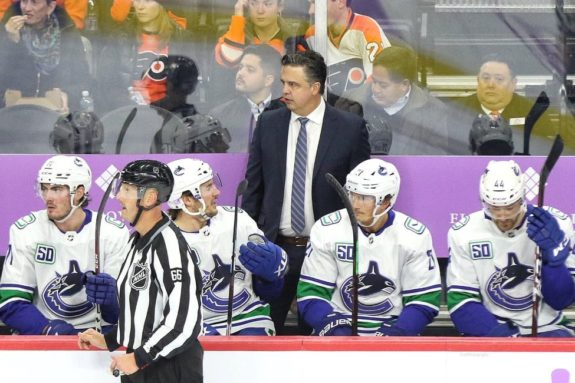
And while the fanbase is justifiably excited about the team’s performance – excluding the entire month of November – there are a few things to consider that will impact the team’s outlook moving forward.
Lingering cap concerns, the looming expansion draft, plus improved player performance and the subsequent contract negotiations (this is actually a very good problem to have) will all play a part in what this team will look like for the remainder of this season and beyond.
The Cap Conundrum
Let’s dive into the Canucks’ current cap situation and look at two players due for new contracts and how their performance this season could dictate those talks: Jacob Markstrom and Jake Virtanen.
If the cap doesn’t increase this summer, which it may, the Canucks will have roughly $17 million in cap space to play with, after accounting for Roberto Luongo’s recapture penalty, Ryan Spooner’s buyout, and ELC bonuses that will be owed to Elias Pettersson and Quinn Hughes. If we generously assume the cap increases by $2 million, the Canucks would have just under $19 million in free space. Of course, Pettersson and Hughes are due for their first big contracts the following summer. This could get messy.
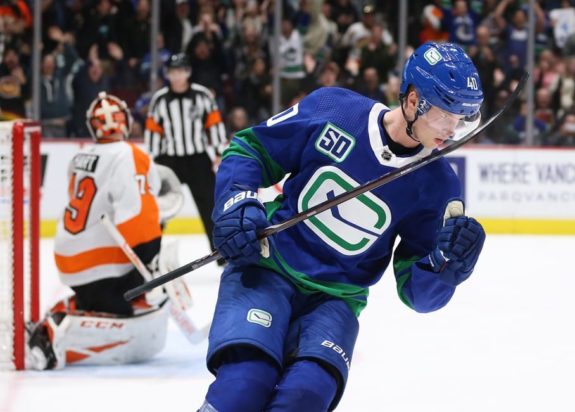
Tyler Motte (restricted free agent with arbitration rights), Zack Macewan (RFA with arbitration rights), Tim Schaller, Oscar Fantenberg, and Tyler Graovac have been excluded from the list because I don’t think their situations will be too challenging for Canucks management.
Jacob Markstrom
Markstrom’s excellent play over the last three seasons has put the Canucks in a challenging spot, especially with the Seattle expansion draft set to take place in two summers. Additionally, he’s taken his game to a completely new level in 2019-20.
The 29-year-old has been the team’s most valuable player for the past two years, so he carries significant leverage into a contract negotiation. Now, in the last year of his deal, which carries a $3.67 million annual cap hit, the Swedish goaltender will be looking for a raise and likely a long-term commitment.
Coupled with promising backup Thatcher Demko’s concerning concussion history and lack of experience for prospects Michael DiPietro and Arturs Silovs, losing Markstrom in free agency would significantly set the Canucks back as they aim to solidify themselves as a consistent playoff team.
Statistically speaking, Markstrom has been solid. His 2.80 Goals Saved Above Average (GSAA) at 5-on-5 ranks 12th for NHL starters according to Natural Stat Trick. GSAA is a stat comparable to Wins Above Replacement (WAR) in baseball that measures the number of goals saved by a player above average based on the number of shots they’ve faced. If a player has a GSAA of 0, they have saved the number of goals equivalent to what a league-average goalie would per shots against.
Further, the Galve native ranks 10th in High Danger Save Percentage (HDSV%) despite the Canucks allowing the fourth closest shot distance on average with Markstrom tending the twine. This cements Markstrom’s narrative for standing on his head to steal games for the Canucks.
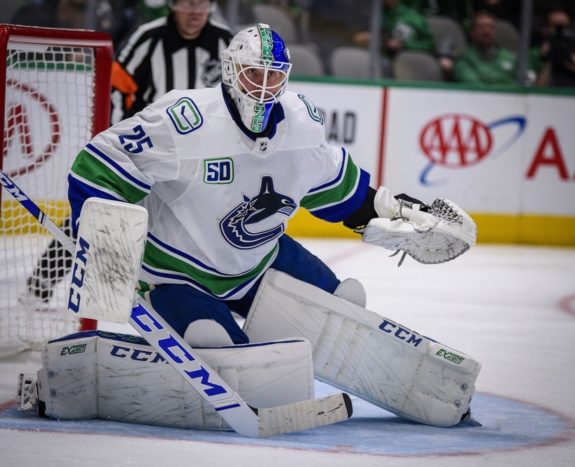
Markstrom has won the eighth most games, holds the seventh highest save percentage (amongst starters) and faced the sixth most shots this season, Markstrom’s campaign qualifies him as an above average starting goaltender – on the brink of the elite – halfway through the year.
Markstrom’s performance in 2019-20 puts him in a cluster with goalies like Connor Hellebuyck, Semyon Varlamov, Jordan Binnington, and John Gibson. Given that Markstrom is currently in his prime, he would presumably want to maximize his earnings as this could be his last big contract in the NHL. The average annual salaries of the aforementioned players are just over $5.5 million. This is close to the range in which I believe Markstrom will be signed – he could argue that he has earned a contract between $5-6 million per year, with four or five years of term.
Based on the estimates listed above, this would leave Vancouver with around $11-13 million to re-sign the other players listed.
It helps that Markstrom has expressed a desire to stay in Vancouver, which provides hope for a potential discount despite earning the right to be wooed by teams during free agency. At the end of last season Markstrom’s agent told Sportsnet radio:
I have had discussions with Jacob, and he calls Vancouver home. He would like to be a part of it long term. That’s where his instructions will lean, to try and get something done…It takes two to get a deal done, it takes term and it takes dollars. The player has to be willing and Jacob has enjoyed his time in Vancouver and wants it to continue.
Any dollar saved on Markstrom, who will presumably be the team’s most expensive deal over the summer, could determine whether other expiring contracts can be resigned or not.
Jake Virtanen: RFA With Arbitration Rights
The 2014 sixth-overall selection has been a source of both great frustration and optimism amongst Canucks nation throughout his young career. His physical gifts are tremendous but has had trouble parlaying those tools into on-ice production through the first several years of his career.
In 2019-20, he has cemented himself as a solid forward who plays with a physical edge the Canucks otherwise lack, while contributing more offensively since being placed on the second power play unit.
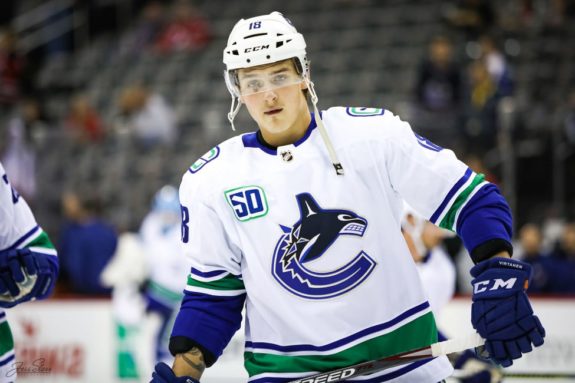
With 28 points in 49 games, he has already surpassed his career high of 25, set last season. At this pace, the winger is set to obliterate that and potentially reach the 45- to 50-point threshold while accumulating 20 or more goals.
However, it should be noted that Virtanen ranks second in the league in Individual Points Percentage (IPP), collecting points on a whopping 95.45 percent of goals scored while he was on the ice. This is a large step up from the 67.86 percent he had last year, suggesting that his point totals this year may be inflated. Nonetheless, he is making the most of the final year of his contract. Virtanen makes just $1.25 million, which is a bargain relative to his production, and he’s due for a significant raise.
Virtanen’s 2.71 points per-60 minutes this season and average ice time per game of 12:38 (which is bound to increase as the season wears on) put him in a cluster with players like Minnesota Wild’s Kevin Fiala (14:35 TOI/game, 2.52 PP/60), Arizona Coyotes’ Nick Schmaltz (15:40 TOI/game, 2.63 PP/60, and New Jersey Devils’ Nikita Gusev (14:06 TOI/game, 2.65 PP/60). All players are considered to have higher ceilings than they’re currently showing and are between 23 and 27 years old.
The average salary of these players is $4.45 million. Fiala and Gusev both have two years remaining on their deals while Schmaltz is signed through 2025-26. Let’s assume Schmaltz’ current cap number is inflated due to the term. Virtanen is still justified in asking for a contract in the $3.5-$4 million range, with at least two or three years of term, especially given his arbitration rights.
Let’s assume general manager Jim Benning works some sort of magic and he signs at the lower end of that. Now, the Canucks have around $8-$10 million in cap space to work with to sign the following players:
- Chris Tanev: (UFA)
- Adam Gaudette: (RFA)
- Josh Leivo (UFA)
- Troy Stecher (RFA with arbitration rights)
I would guess that both Gaudette and Leivo will be signed with little trouble. Both players have demonstrated their value to the team and shouldn’t break the bank. The unfortunate timing of Leivo’s injury favours the Canucks’ side of the negotiations too.
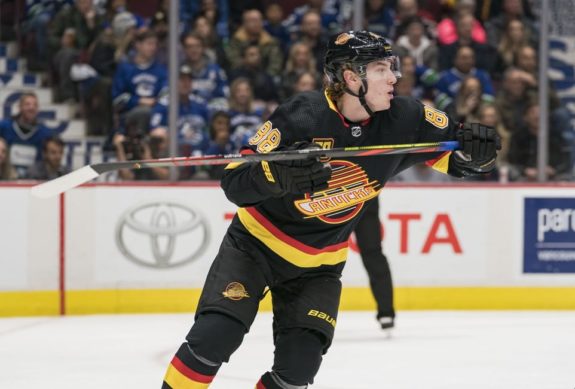
Tanev and Stecher are less certain. Of the two, I believe Tanev is more likely to be retained, at a slightly lower cap-hit than his current $4.45 million price tag. Having played no more than 53 games in any of the past three seasons (although he is on pace to eclipse that number this year), re-signing Tanev at or above his current salary could become an albatross – he just turned 30 and has been perennially injured but still has utility and is an important player on Vancouver’s roster.
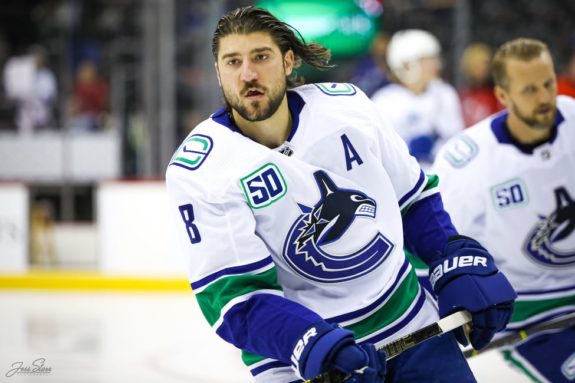
Stecher has become a fan-favourite in his few years in Vancouver – a home-town kid who plays hard and never cheats the fans. But with the emergence of Brogan Rafferty in the AHL, the continued development of prospects Olli Juolevi, Jett Woo, and Jack Rathbone, and the presence of Jordie Benn, he’s no longer a necessity. I still like his ability in a bottom-pairing role, it just depends on the cap hit. If we assume Alex Edler will either retire or play elsewhere after his contract expires post-next season, it might be valuable to re-sign both.
The Demko Dilemma
An elite starting goalie and an up-and-comer with high-end potential. Does this sound familiar to anyone? Canucks fans might consider the Markstrom/Demko tandem deja-vu inducing, but it’s a good problem to have.
Benning’s interview earlier this week with Thomas Drance of The Athletic provides a slight insight as to how this situation may unfold in the next couple months. He confirmed that both Vancouver and Markstrom’s camp have mutual interest in each other and consider it a priority. However, he also acknowledged that there is a possibility that a deal may not get done therefore, the Canucks will have to consider other options.
“We have Thatcher and we’ll have to decide what else we want to do, to bring in someone else or if we have someone internally that can fill that position.”
from (‘One-on-one with Jim Benning: On the Canucks’ cap structure, contract talks and his trade deadline shopping list,’ The Athletic, 01/21/2020)
My interpretation is that Demko is here for the long haul and that Markstrom remains until the season’s conclusion at minimum. Lots can change from now until the trade deadline. Plenty of options still remain on the table including a possible extension.
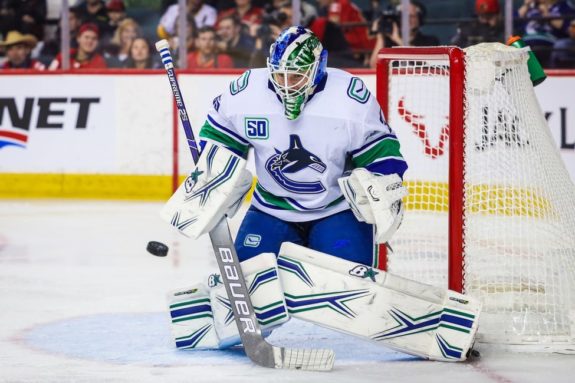
If Vancouver’s management already secured a deal with Markstrom, Demko could be enticing trade bait towards the acquisition of a player that fills a positional need and provides an immediate impact. Minnesota’s Matt Dumba comes to mind and has recently been involved in trade rumors. Since this isn’t the case, it would be too risky to potentially lose both starting goaltenders in the next few months.
However, it wouldn’t be a shocker if the Canucks lost a goalie during next year’s expansion draft. Eventually, the Canucks will be forced to choose between a) exposing one of the goalies and risk losing the exposed player or b) relinquish assets (likely a second-round pick or more) to Seattle so they don’t take either.
Given that Benning seems to be favouring holding onto both goalies for now, I think the Canucks should aim to give up assets in effort for expansion protection. If the Canucks are committed towards winning, it’s probable for that draft pick to be later in the round. It would be much less damaging to lose an unproven prospect or draft pick than an NHL quality netminders, given the price is right.
With all these imminent situations approaching, it is an alluring time to be a Canucks supporter. Most importantly, it is refreshing that the team is finally competitive enough where these tough decisions require more thought as the stakes keep ascending.
The post Canucks Have Big Decisions on Free Agents & Expansion appeared first on The Hockey Writers.
Popular Articles

















































 Canucks Vancouver
Canucks Vancouver Sharks San Jose
Sharks San Jose Flames Calgary
Flames Calgary Avalanche Colorado
Avalanche Colorado Coyotes Arizona
Coyotes Arizona Golden Knights Vegas
Golden Knights Vegas Wild Minnesota
Wild Minnesota Red Wings Detroit
Red Wings Detroit Blues St. Louis
Blues St. Louis Blackhawks Chicago
Blackhawks Chicago Blue Jackets Columbus
Blue Jackets Columbus Hurricanes Carolina
Hurricanes Carolina Jets Winnipeg
Jets Winnipeg Predators Nashville
Predators Nashville Ducks Anaheim
Ducks Anaheim Oilers Edmonton
Oilers Edmonton Sabres Buffalo
Sabres Buffalo Rangers New York
Rangers New York Bruins Boston
Bruins Boston Panthers Florida
Panthers Florida Senators Ottawa
Senators Ottawa Lightning Tampa Bay
Lightning Tampa Bay Capitals Washington
Capitals Washington Islanders New York
Islanders New York Devils New Jersey
Devils New Jersey Maple Leafs Toronto
Maple Leafs Toronto Flyers Philadelphia
Flyers Philadelphia Penguins Pittsburgh
Penguins Pittsburgh Stars Dallas
Stars Dallas Kraken Seattle
Kraken Seattle Kings Los Angeles
Kings Los Angeles






